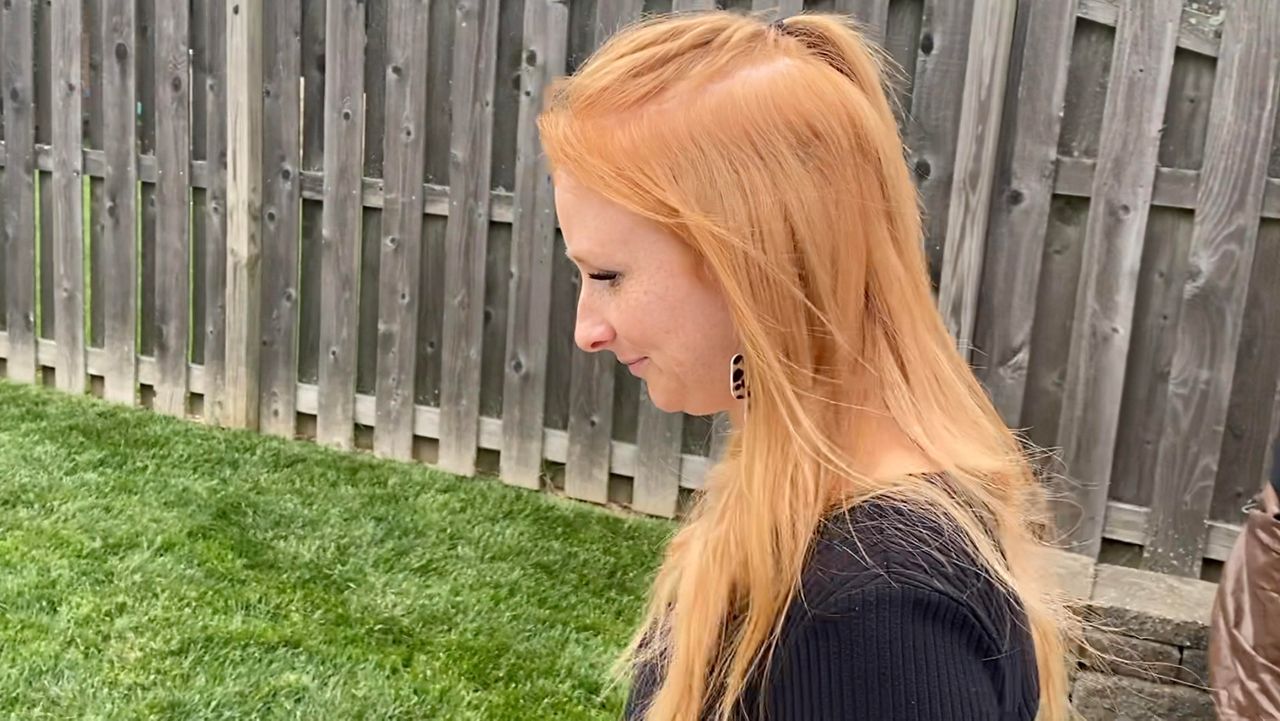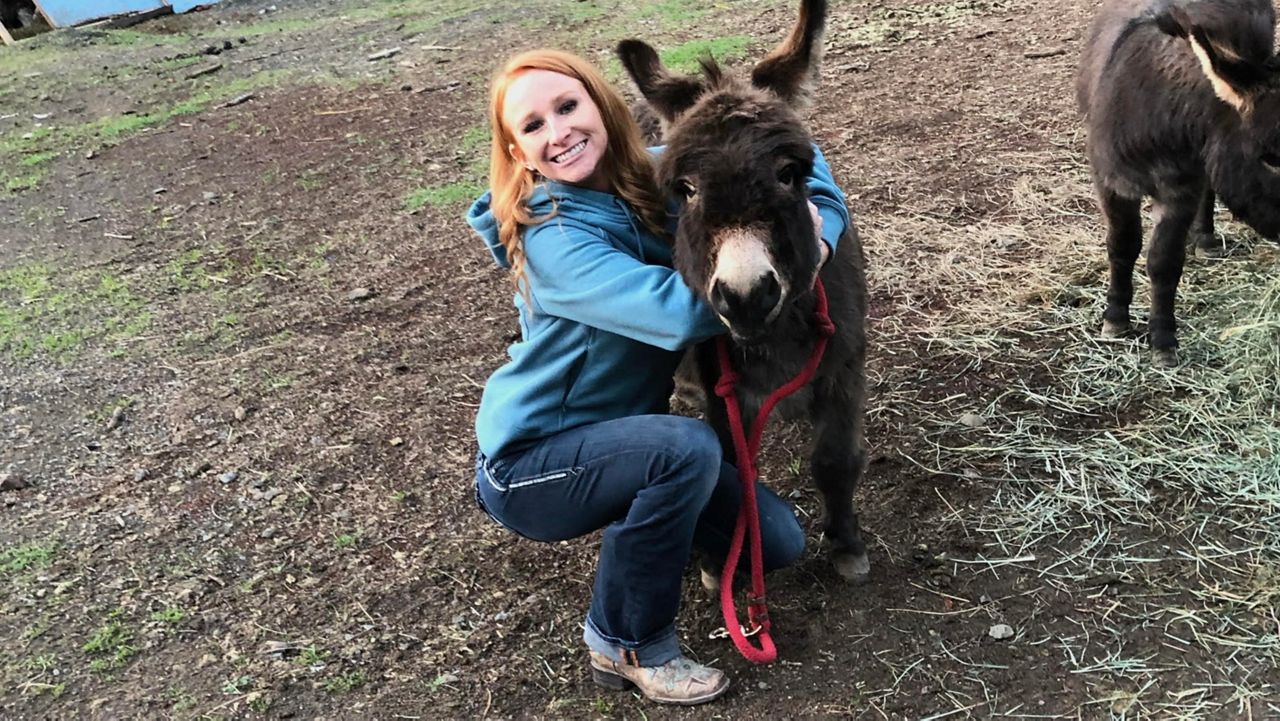FLORENCE, Ky. — It’s just as real as a broken leg, but not as easy to see.
Mental illness being less stigmatized now than ever before means patients have more options for treatment, but there’s also more demand.
That can sometimes create enormous problems for people who don’t have time to wait.
What You Need To Know
- Michaela Mullins says she struggled to get the mental health medication she needed in Northern Kentucky
- Mullins suffers from bipolar disorder, which brings on manic episodes
- She had to check herself into a psychiatric unit to get her meds, because the wait to see a psychiatrist was taking too long
- St. Elizabeth is working on hiring more mental health professionals to cut down on the wait time for patients
Michaela Mullins needed a fresh start.
“I wake up every morning, just not in a great mood. I don’t ever wake up happy,” she said. “And I have to force myself to be happy. And that’s just part of the process. That’s part of the work.”
She said several traumatic relationships over the past few years have affected her and her mental health negatively.
Mullins packed her bags in northern California and moved to northern Kentucky, where she’s been living since the end of January. She wanted to be close to her half sister Brandy, who’s one of the biggest pieces in her support system.
The problem is: she had to leave another big piece—her long-time psychiatrist—behind.
That meant she couldn’t get the medications she needed.
“And I spent hours and days on the phone, crying with people, begging for help, saying I need these meds, I need an appointment. I need help,” Mullins said. “It kind of makes you want to give up sometimes. Because it’s like if the people who are here to help me can’t help me, why am I even helping myself?”

Mullins suffers from posttraumatic stress disorder, depression and bipolar disorder, which brings on manic episodes. She said she’s been on medication for as a long as she can remember.
“Bipolar is a lot of outbursts, being angry, not being able to control your emotions,” she said. “So I have really high highs, and really low lows.”
It’s something that’s affected her life in terms of money and relationships, and something she tries as hard as she can to stay on top of.
“Because I’ve seen myself be in places where I do crazy things, and then I look back, and I’m like, ‘Oh, that was the mania. I don’t know why I did that,’” she said.
The medicine Seroquel helps level her out, and that it’s difficult for her to function without it.
She said she kept getting told for weeks she couldn’t get a new prescription for her medicine until she saw a psychiatrist.
“It’s so hard to get with a psychiatrist to prescribe the meds,” she said. “I left so many voicemails. I only heard back from one psychiatrist. And she said they didn’t have any appointments for weeks. So it was kind of, you know, I can’t help you.”
To Mullins, it made little sense for the process to be so difficult. She began having withdrawals.

“They’re called brain zaps, where it feels like your brain is being electrocuted, and tracers, where when you look around the room, it feels like everything is going in slow motion. And that’s when you’re coming off of medication,” she said. “A lot of people in my situation, who have bipolar, or schizophrenia or anything, when they can’t get their meds, they turn to hard, illegal drugs.”
That’s not a route Mullins ever took, but she pleaded with the people she was talking to that if she couldn’t get her medicine, she’d hurt herself or even take her own life.
“I have such a checkered past with self harm and suicide attempts,” she said. “And nobody could help me, so I ended up having to check myself into the psychiatric unit at the hospital to get the meds that I needed.”
Willingly checking herself into a psych ward wasn’t something Mullins wanted to do. But she felt she needed to.
“I called off work unfortunately, and was pretty sure I was going to spend the whole weekend in the psych ward to get meds,” she said. “That was my only option at that point. It was either, I do this, and I pack a bag for the weekend, and expect to be there over the weekend to get meds, or I withdraw off this medication, which is really dangerous to do.”
That was at St. Elizabeth in Florence. Mullins said the staff could help her and calm her nerves.
St. Elizabeth physician assistant Laura Kremer said there are more options for mental health treatment in northern Kentucky than ever before, but there are also a lot more people seeking help.
She said there are about 900 to 1,000 visits across the behavioral health spectrum per week. About 120 of those end up being new patients.
“The demand has grown faster than what our practice has grown in terms of providers, even though we have grown tremendously. St. Elizabeth recognizes that we haven’t quite grown as fast as the need has grown, which is why they’re actively recruiting for 10 different positions,” Kremer said.
Most of those are new positions, including medication prescribers and therapy providers. She said it's difficult to hire mental health providers because there is not an abundance of them available.
The wait to see somebody for the acute psychiatric intervention clinic can be weeks. For the outpatient clinic, it’s months.
“Hopefully we can get down to a couple of weeks instead of a couple of months for everybody that needs to be seen. But in order for that to happen, we do need more providers,” Kremer said.
Studies show a combination of talk therapy and medication is most effective in treating moderate-to-severe cases of mental illness. A healthy lifestyle including eating well, getting enough sleep and exercise are also important factors to consider, Kremer said.
In terms of newer forms of treatment, St. Elizabeth has recently been offering transcranial magnetic stimulation (TMS), which uses a magnet to jumpstart areas less active in a depressed brain. Kremer said it has been very effective for many patients.
On the horizon, St. Elizabeth is also looking into Esketamine treatment, which is a medicine sprayed into the nose. Kremer said it has been effective at treating depression more quickly than other methods.
Kremer said more people feeling empowered to address their mental health is overall a great thing.
“I think that while there’s still a lot of stigma left to be managed, I think that there’s certainly less stigma now than what there used to be,” she said.
Mullins agreed, though she said she’d like to see the growth in treatment speed up.
“Someone begging health care providers and crying at a pharmacy, trying to get their meds, should not be normal,” Mullins said.
While she continues to wait for a new psychiatrist, Mullins said it’s taking all of her strength just to maintain.
“I made it this far without letting the mania, and the depression and all that take over. I’ve got to keep trying,” she said.
Anyone in northern Kentucky seeking help for their mental health can get connected to a St. Elizabeth provider here.



